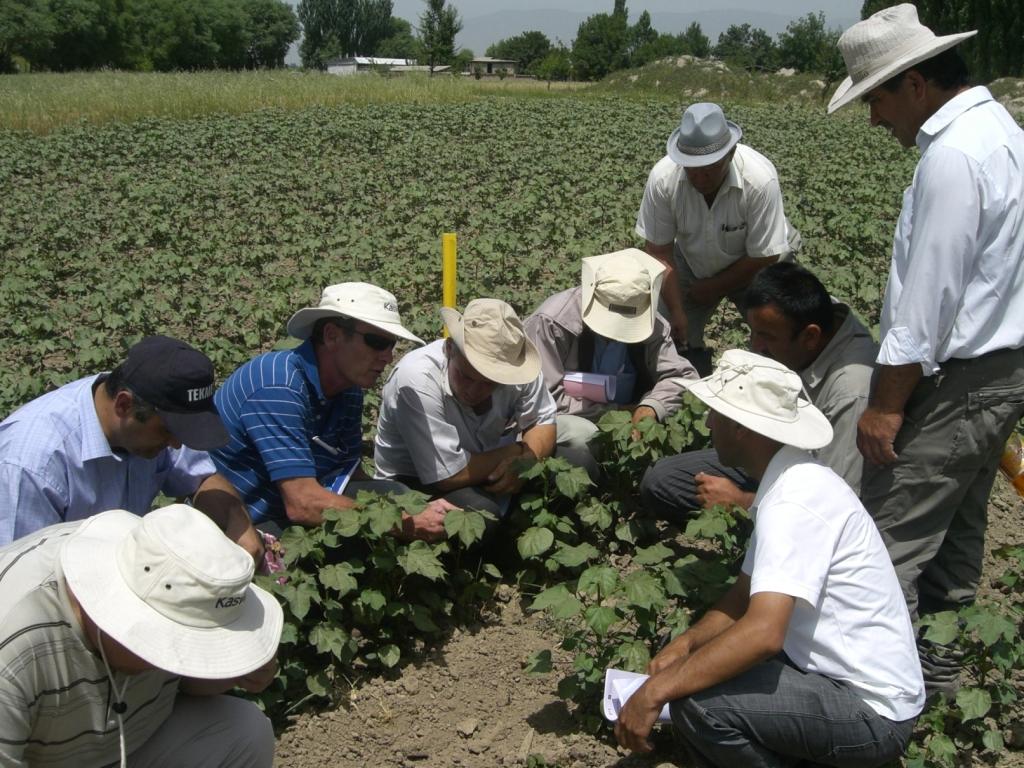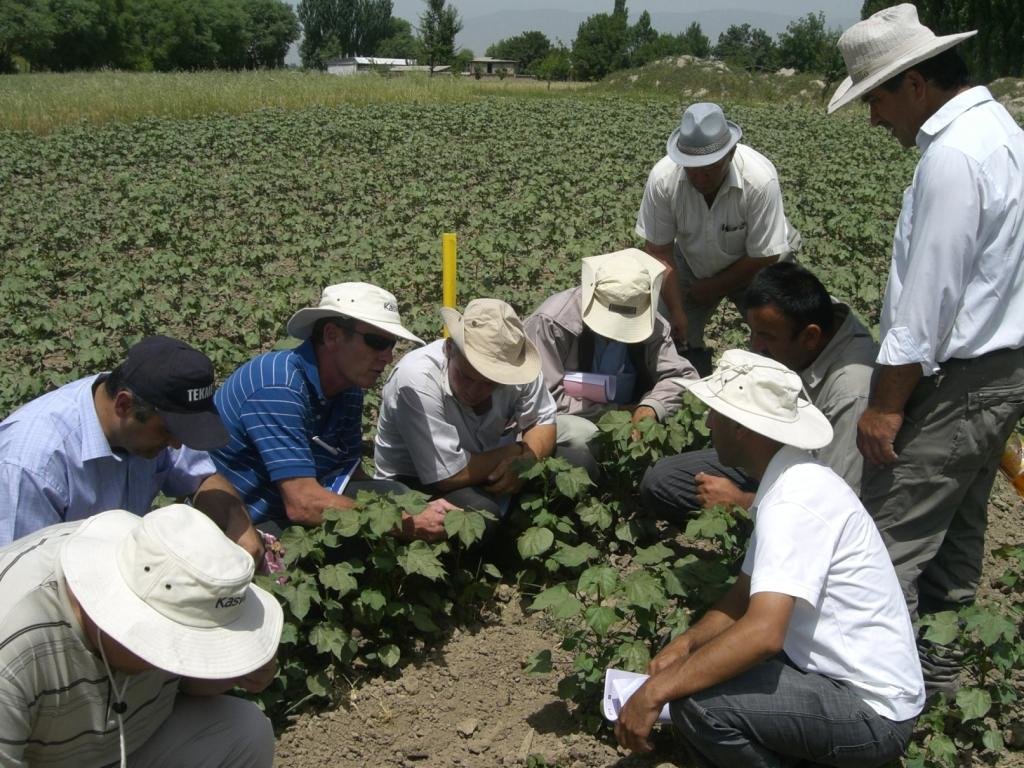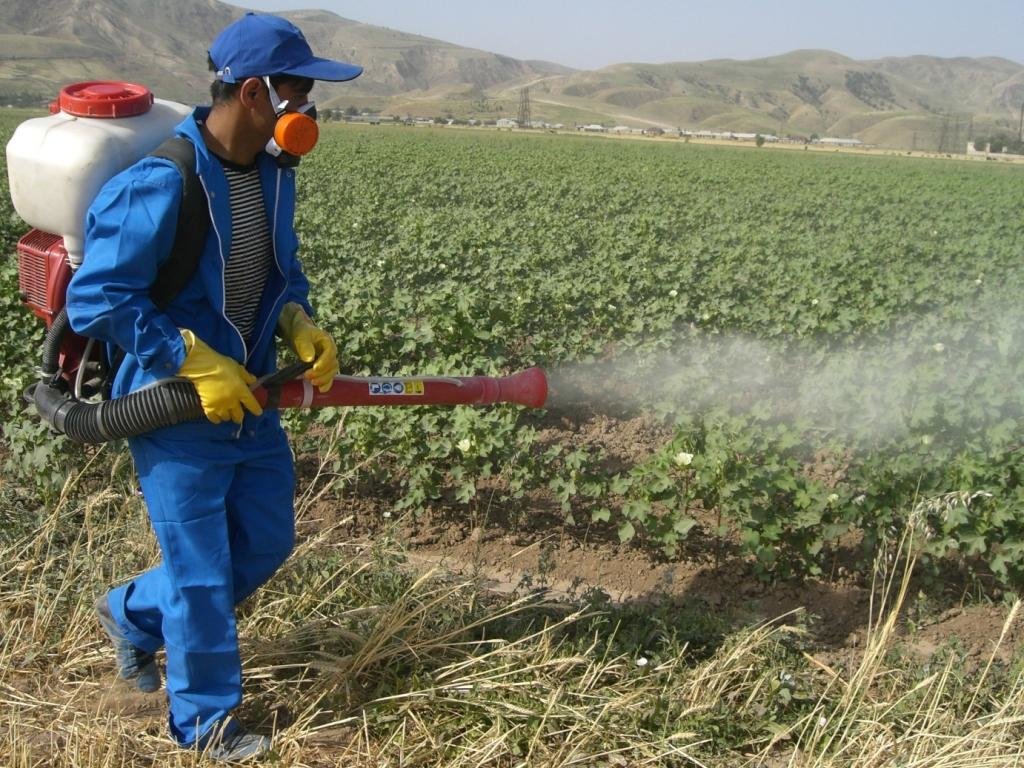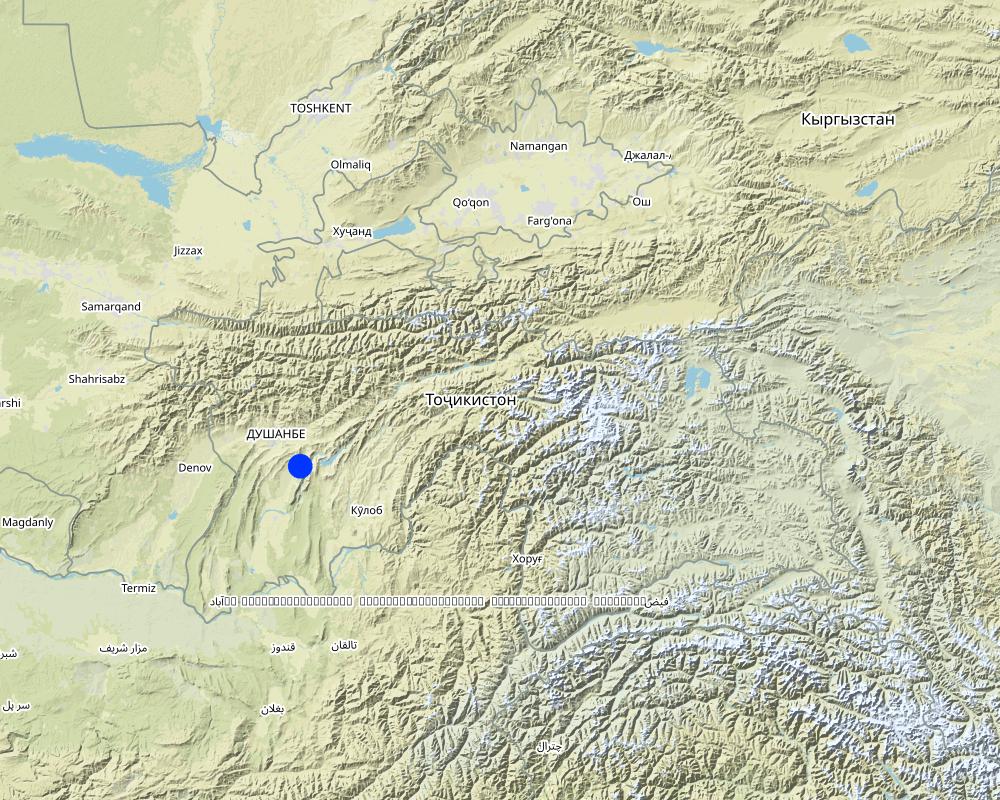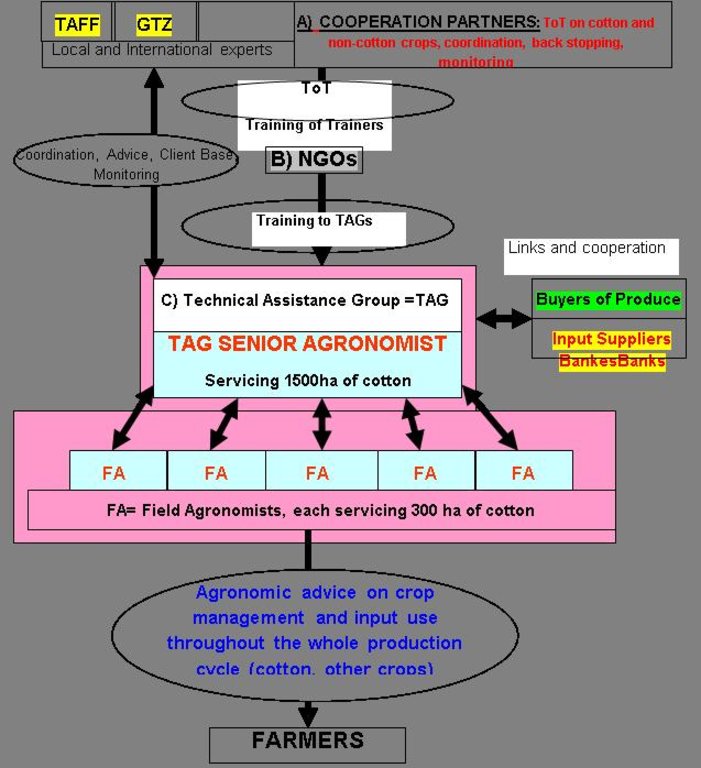Technical Assistance Groups (TAG) [Tayikistán]
- Creación:
- Actualización:
- Compilador: Philippe Zahner
- Editor: –
- Revisores: David Streiff, Alexandra Gavilano, Joana Eichenberger
approaches_2448 - Tayikistán
Visualizar secciones
Expandir todo Colapsar todos1. Información general
1.2 Detalles de contacto de las personas de referencia e instituciones involucradas en la evaluación y la documentación del Enfoque
Especialista MST:
Weissen Hugo
hugoweissen@kaswag.com.au
Austria
Especialista MST:
Kaelin Laurie
lauriekaelin@kaswag.com.au
Austria
Nombre del proyecto que facilitó la documentación/ evaluación del Enfoque (si fuera relevante)
Pilot Program for Climate Resilience, Tajikistan (WB / PPCR)Nombre de la(s) institución(es) que facilitaron la documentación/ evaluación del Enfoque si fuera relevante)
Deutsche Gesellschaft für Internationale Zusammenarbeit (GIZ) - Alemania1.3 Condiciones referidas al uso de datos documentados mediante WOCAT
¿Cuándo se compilaron los datos (en el campo)?
20/05/2011
El compilador y la/s persona(s) de referencia claves aceptan las condiciones acerca del uso de los datos documentados mediante WOCAT :
Sí
2. Descripción del Enfoque MST
2.1 Breve descripción del Enfoque
Technical advisory groups working on a 'fee for service' basis provide an effective service to farmers to achieve measurable yield increases, based on regular crop monitoring, crop management advice and effective use of inputs (fertilisers, water, pesticides, etc.)
2.2 Descripción detallada del Enfoque MST
Descripción detallada del Enfoque MST:
Aims / objectives: The TAG concept is designed to achieve the following key objectives: (1) Provide an effective agronomic advisory service to farmers to achieve measurable yield increases, based on regular crop monitoring, crop management advice and effective use of inputs (fertilisers, water, pesticides, etc.), (2) Support the development of agricultural input supply and distribution, and (3) Operate as independent entities on a competitive 'fee for service' basis (fee per ha), working towards achieving self sustainability.
Methods: TAGs are the central component of the framework and follow a very simple operational structure, basically consisting of a “Senior Agronomist” (SA), a “Organisation Manager” (OM) and a defined number of “Field Agronomists” (FA). The SA will register an advisory business as well as the OM and FA. The cooperation will be regulated by cooperation contracts. The SA will engage directly into service contracts with farmer clients to whom they will provide crop management recommendations throughout the entire production cycles. TAGs will be based in defined geographic areas, operating with local staff (SA, OM, FA) and build up a customer base large enough for financial self sustainability.
Stages of implementation: (1) TAGs are registered as enterprises, (2) TAGs develop business plans, (3) TAGs develop work plans and field records, (4) each TAG signs contract with cooperation partners (TAFF and GIZ-PSD project), (5) TAGs get first payment from cooperation partners (555 USD per TAG), (6) TAGs sign consulting contracts for 500 ha, farmers pledge to pay for advisory service 24 TJS/ha in the whole season, (7) quality control of advisory contracts concluded: visit of contracted farms to ensure the farmers understand the TAG-system, (8) TAGs do market analysis for the regional availability of suppliers for pesticides, fertiliser etc., mechanisation contractors, banks, buyers, (9) second payment from cooperation partners, 5 TJS per ha up to 500 ha contracted area per TAG, (10) third payment from cooperation partners, same conditions as previous point, (11) fourth payment from cooperation partners, 12 TJS per ha contracted area (only if field advisors are contracted and have received first salary, first field records are made and filed to the TAG documentation), (12) first payment from clients/farmers, 12 TJS per ha contracted area, (13) second payment from clients/farmers, 12 TJS per ha contracted area, (14) fifth payment from cooperation partners, 5 TJS per ha contracted area (only if contracts are fully pay through clients, TAG must handover documentation of their work).
Role of stakeholders: Cooperation partners provide expertise and training, support to the organisational and sustainable development of TAGs and financial support. NGOs (Agricultural Extension Service Providers) will be invited to enter into contract agreements for the provision of training to TAGs. TAGs consist of a “Senior Agronomist” (SA), a “Organisation Manager” (OM) and a defined number of “Field Agronomists” (FA).
2.3 Fotos del Enfoque
2.5 País/ región/ lugares donde el Enfoque fue aplicado
País:
Tayikistán
Región/ Estado/ Provincia:
Khatlon, Soghd, RSS
Especifique más el lugar :
Yovon, Hissor, Vakhsh, Djomi, Konibodom, Zafar, Kuljob, Vose
Map
×2.6 Fechas de inicio y conclusión del Enfoque
Indique año del inicio:
2011
2.7 Tipo de Enfoque
- proyecto/ basado en un programa
2.8 Propósitos/ objetivos principales del Enfoque
The Approach focused mainly on other activities than SLM (productivity increase)
The main objectives of the approach were to: (1) Provide an effective agronomic advisory service to farmers to achieve measurable yield increases, based on regular crop monitoring, crop management advice and effective use of inputs (fertilisers, water, pesticides, etc). (2) Support the development of agricultural input supply and distribution. (3) Operate as independent entities on a competitive 'fee for service' basis (fee per ha), working from the start towards achieving self sustainability.
The SLM Approach addressed the following problems: low agricultural production, lack of technical knowledge
2.9 Condiciones que facilitan o impiden la implementación de la/s Tecnología/s aplicadas bajo el Enfoque
entorno institucional
- impiden
weak capacity of governmental agricultural extension services
Treatment through the SLM Approach: establishment of independent agricultural extension services
conocimiento de MST, acceso a apoyo técnico
- impiden
little or no access of farmers to effective agronomic technical assistance services
Treatment through the SLM Approach: establishment of technical advisory groups TAGs
3. Participación y roles de las partes interesadas involucradas
3.1 Partes interesadas involucradas en el Enfoque y sus roles
- usuarios locales de tierras/ comunidades locales
Entered contracts with TAGs to employ their advisory services
- especialistas MST/consejeros agrícolas
All senior agronomists are male. They were selected on the basis of their perceived experience and agronomy knowledge. Field agronomists were selected by their respective SA. Some of the field agronomists are female.
Received training provided by the cooperation partners (training of trainers)
- ONG
AIN, ATAC and SAS Consulting (and other agricultural extension NGOs)
- organización internacional
GIZ-PSD project, TAFF Tajik Agricultural Finance Framework (EBRD)
3.2 Involucramiento de los usuarios locales de tierras/ comunidades locales en las distintas fases del Enfoque
| Involucramiento de los usuarios locales de tierras/ comunidades locales | Especifique quién se involucró y describa las actividades | |
|---|---|---|
| iniciación/ motivación | ninguno | |
| planificación | ninguno | |
| implementación | pasivo | the land users pay the TAGs for their services with a service fee |
| monitoreo y evaluación | ninguno | |
| Research | ninguno |
3.3 Flujograma (si estuviera disponible)
3.4 La toma de decisiones en la selección de Tecnología(s) MST
Especifique quién decidió la selección de las Tecnología/ Tecnologías a implementarse:
- solo por especialistas MST
Explique:
agricultural extension service to provide assistance to land users
Decisions on the method of implementing the SLM Technology were made by by SLM specialists alone (top-down)
4. Apoyo técnico, fortalecimiento institucional y gestión del conocimiento
4.1 Construcción de capacidades / capacitación
¿Se proporcionó la capacitación a usuarios de tierras/ otras partes interesadas?
Sí
Especifique quién fue capacitado:
- personal de campo/ consejeros
Forma de capacitación:
- technical advisory service
Temas avanzados:
Innovative approaches to crop management, effective use of agricultural inputs (fertilizers, pesticides, water, etc), basics of advisory work, cotton growing, modern ways of plant protection, cooperation with other service providers, improving the performance of the TAG team, and improving the TAG business were key focus points.
4.2 Servicio de asesoría
¿Los usuarios de tierras tienen acceso a un servicio de asesoría?
Sí
Especifique si servicio proporcionado se realizó:
- en centros permanentes
Describa/ comentarios:
Technical Assisstance Groups (TAGs); Key elements: TAGs provide know-how on modern crop production and crop management techniques to individual farmer clients., TAGs establish links with input providers and buyers of produce, TAGs are financially self-sustainable through the service fee they collect from farmer clients
Advisory service is quite adequate to ensure the continuation of land conservation activities; The value of crop rotation to conservation and improvement of soil health is clear to the TAG. Problems associated with erosion and fertiliser leaching are being discussed in field training sessions.
4.3 Fortalecimiento institucional (desarrollo institucional)
¿Se establecieron o fortalecieron instituciones mediante el Enfoque?
- sí, mucho
Especifique el nivel o los niveles en los que se fortalecieron o establecieron las instituciones:
- local
Especifique el tipo de apoyo:
- financiero
- construcción de capacidades/ entrenamiento
Proporcione detalles adicionales:
The TAGs were registered as formal entities. They were supported by the coordination partners financially and through training sessions.
4.4 Monitoreo y evaluación
¿El monitoreo y la evaluación forman parte del Enfoque?
Sí
Comentarios:
economic / production aspects were regular monitored by project staff, land users through measurements; indicators: Measurement of yields by TAG and farmers, accumulation of data over time
area treated aspects were regular monitored by project staff, land users through observations; indicators: Approx. 17,000 ha being covered by TAG
area treated aspects were regular monitored by project staff, land users through measurements; indicators: Nearly 900 Dehkan Farms serviced
no. of land users involved aspects were regular monitored by project staff through observations; indicators: Communication between TAG, land users, input suppliers and project staff
management of Approach aspects were regular monitored by project staff through observations; indicators: gender of contracted farmers
socio-cultural aspects were regular monitored by project staff through observations; indicators: Measurement of yields by TAG and farmers, accumulation of data over time
economic / production aspects were regular monitored by project staff, land users through observations; indicators: Agronomic measurements of crop progress by TAG and project staff
technical aspects were regular monitored by project staff through measurements; indicators: Comprehensive collection of land use activities
technical aspects were regular monitored by project staff through observations; indicators: None
management of Approach aspects were regular monitored by None through measurements; indicators: None
There were several changes in the Approach as a result of monitoring and evaluation: Introduction of record keeping for field activities to serve as a decision making tool in the future. Introduction of systematic crop progress evaluations enabling much improved crop management. Communication between farmers and input suppliers is streamlined, with the expected outcome of improvements in quality and timing of input usage.
There were several changes in the Technology as a result of monitoring and evaluation: New tools introduced for record keeping and crop progress monitoring. Improvements in timing and quality of field activities (cultivation, fertilisation, irrigation etc). Improved access regarding timeliness and quality of production inputs.
4.5 Investigación
¿La investigación formó parte del Enfoque?
Sí
Especifique los temas:
- economía/ marketing
Proporcione detalles adicionales e indique quién hizo la investigación:
Market analysis of regional availability of suppliers of pesticides, fertiliser etc., mechanisation contractors, banks, buyers.
5. Financiamiento y apoyo material externo
5.1 Presupuesto anual para el componente MST del Enfoque
Comentarios (ej. fuentes principales de financiamiento/ donantes principales):
Approach costs were met by the following donors: international (GIZ-PSD, TAFF): 20.0%; national non-government (TAGs): 80.0%
5.2 Apoyo financiero/material proporcionado a los usuarios de tierras
¿Los usuarios de tierras recibieron financiamiento/ apoyo material para implementar la Tecnología/ Tecnologías? :
Sí
Si respondió sí, especifique el tipo o los tipos de apoyo, condiciones y proveedor(es) :
TAFF/GIZ-PSD project will provide a voucher to the senior agronomists to pay for additional NGO services, which they might need based on individual requirements. The voucher will cover 80% of the cost
5.3 Subsidios para insumos específicos (incluyendo mano de obra)
- otro
| Otro (especifique) | En qué grado | Especifique los subsidios |
|---|---|---|
| Establishment of TAGs at the beginning | parcialmente financiado |
Comentarios:
During the initial establishment period of the TAGs they received 5 supportive payments. Those are either fixed amounts, or based on the number of hectares contracted by the TAGs
5.4 Crédito
¿Se proporcionó crédito bajo el Enfoque para actividades MST?
No
6. Análisis de impacto y comentarios de conclusión
6.1 Impactos del Enfoque
¿El Enfoque ayudó a los usuarios de tierras a implementar y mantener Tecnologías MST?
- No
- Sí, un poco
- Sí, moderadamente
- Sí, mucho
In the longer term land users benefit from agronomic advise to improve sustainable land management (e.g. fertiliser use, irrigation efficiency, crop rotation).
¿El Enfoque empoderó a grupos en desventaja social y económica?
- No
- Sí, un poco
- Sí, moderadamente
- Sí, mucho
Employment of male and female agronomists through TAG, partly funded by service receivers (farmers). Expected increases in land productivity as a result of advice will lead to higher farm income.
Did the Approach lead to improved livelihoods / human well-being?
- No
- Sí, un poco
- Sí, moderadamente
- Sí, mucho
Employment of agronomists through TAG, is partly funded by the service receivers (farmers). Expected increases in land productivity as a result of this agronomy advice will lead to higher farm income.
Did the Approach help to alleviate poverty?
- No
- Sí, un poco
- Sí, moderadamente
- Sí, mucho
Employment of male and female agronomists through TAG, partly funded by service receivers (farmers). Expected increases in land productivity as a result of advice will lead to higher farm income.
6.2 Motivación principal del usuario de la tierra para implementar MST
- producción incrementada
Farmers expect increased production as a result of agronomic advice
- incremento de la renta(bilidad), proporción mejorada de costo-beneficio
Framers expect increased farm income as a result of agronomic advice
6.3 Sostenibilidad de las actividades del Enfoque
¿Pueden los usuarios de tierras sostener lo que se implementó mediante el Enfoque (sin apoyo externo)?
- no
Si respondió no o incierto, especifique y comente:
Land users rely on agronomic advice and on timely access to good quality inputs. TAGs, if successful, can provide a service to the farmer for which he/ she is prepared to pay for. TAGs if successful however, are expected to continue and grow their advisory services businesses and become self sustainable.
6.4 Fortalezas/ ventajas del Enfoque
| Fuerzas/ ventajas/ oportunidades desde la perspectiva del usuario de la tierra |
|---|
| Quality agronomic advice (How to sustain/ enhance this strength: Ongoing training und upskilling of agronomists. Establishment of a strong core of agronomic advisors who themselves will train new agronomists as their advisory businesses grow) |
| Fuerzas/ ventajas/ oportunidades desde la perspectiva del compilador o de otra persona de referencia clave |
|---|
| Systematic and professional approach to the provision of services (How to sustain/ enhance this strength: Ongoing training of TAGs and NGOs) |
| TAGs are registered service providers (How to sustain/ enhance this strength: Return clients, increase in client numbers) |
| Networking between TAGs and input suppliers (How to sustain/ enhance this strength: Facilitation and improvement of communication, training) |
7. Referencias y vínculos
7.1 Métodos/ fuentes de información
- visitas de campo, encuestas de campo
- entrevistas con usuarios de tierras
Vínculos y módulos
Expandir todo Colapsar todosVínculos
No hay vínculos
Módulos
No se hallaron módulos


